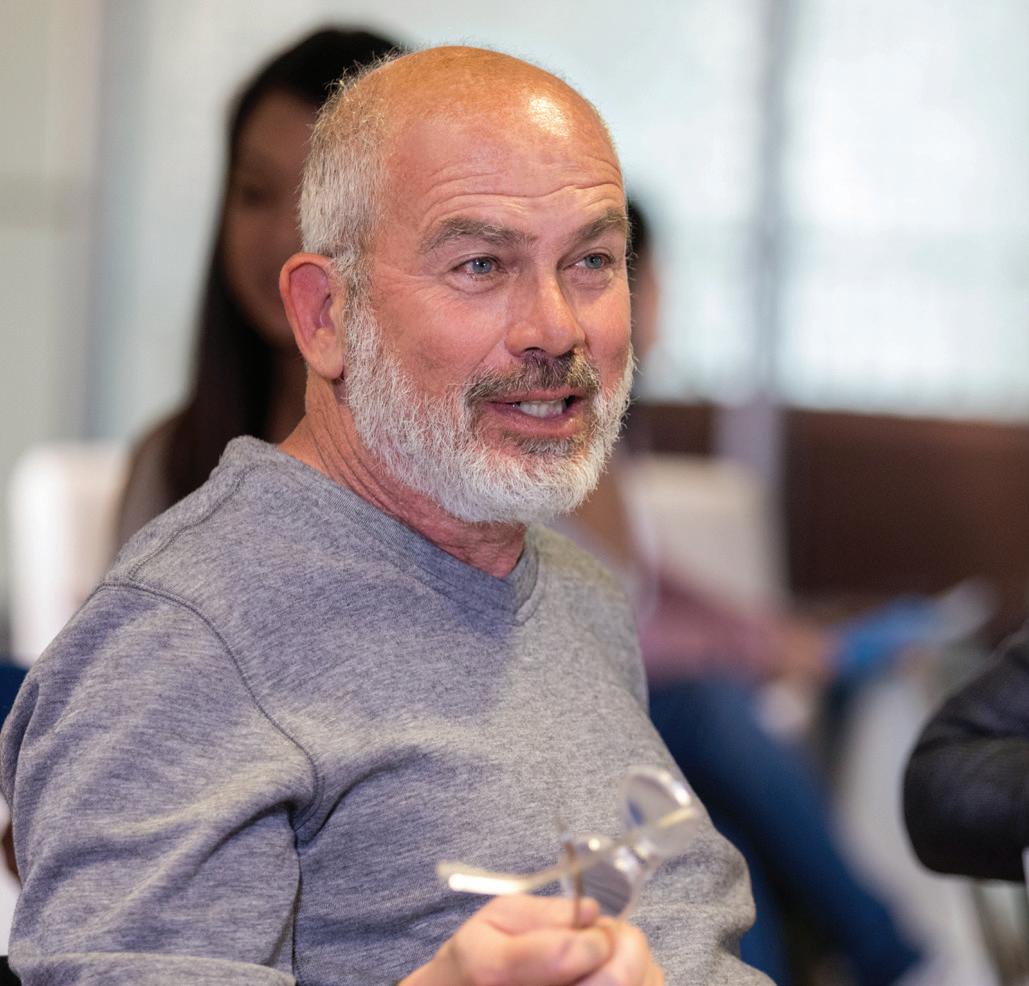
5 minute read
PATIENT VOICE
Keeping patients involved
PATIENT VOICE
Advertisement
One of our main aims for this year was to develop our Patient Panel, both by increasing our number of panelists and ensuring patients living outside of London were represented.
Meetings took place via Zoom to ensure the safety of panel members. In total, 28 patient representatives from across the UK reviewed applications to our 2020 grant call and decided which projects to fund compared to 12 panelists last year, most of whom were London-based.
17 patient representatives reviewed our ‘Treating Prostate Cancer, Questions and Answers’ information booklet. Their input was invaluable in enabling us to ensure our booklet is as useful as possible to the people it is designed to help. In January, we hosted our first ever Meet the Scientists event, in which we brought patients and their family members face-to-face with our funded scientists and facilitated conversations so that researchers, patients and PCR staff could all learn from one another. Following the event, 19/19 of non-scientist participants said they were more confident understanding and asking questions about research. 20 out of 21 scientists said they felt more connected to patients and more motivated as a result.
Despite the restrictions on in-person meetings, we understood the importance of connection during a time when many people are isolated. We worked to bring our community together virtually. We hosted five Zoom Q&As with nine of our funded scientists and overall, the sessions were attended by 172 people. Patients and PCR supporters engaged directly with our scientists during these sessions and were reassured that our research was continuing to make progress for prostate cancer patients.
As a result of our work on Patient Voice, we were delighted to be shortlisted for the 2020 Charity Times Change Project of the Year. The biggest awards ceremony in the sector, the Charity Times Awards celebrates best practice in UK charities and not-for-profit organisations. The Change Project of the Year recognises those who have carried out a significant change project in the past 12 months which has had a positive impact on their service users.
The Infopool
PATIENT VOICE
In March 2021 we launched the first phase of The Infopool, our new patient information, education, and empowerment platform.
IN PARTNERSHIP WITH In this first phase patients and their family members could learn about some potential new developments in drugs, diagnostics and medical devices related to prostate cancer diagnosis, treatment, and care. The Infopool also served to educate patients and family members about the heightened risk of genetic variants and prostate cancer through access to a Hereditary Risk tool, developed by Ovarian Cancer Action. The third aim of The Infopool was to offer patients the opportunity to engage with research and help PCR ensure that other organisations took a much more patientcentric, data-driven, and informed approach to their work.
The first of these research projects on The Infopool took place in March 2021 and consisted of a survey and focus groups for a biotechnology company, CellCentric. The purpose of the project was both to understand the experiences of those people with prostate cancer who had previously been in clinical trials, as well as to get a better understanding from those people who had never been in a trial as to what might persuade or dissuade them from joining. The aim was to provide CellCentric with recommendations to ensure that any future clinical trials it designed were informed by the insights of real patients and had a greater focus on ensuring better quality of life outcomes and experiences in the trials. For PCR the project’s aim was to help us identify strengths and gaps in our own information provision around clinical trials for prostate cancer patients as well as to identify areas where more support would be required.

2019
Our first grant call had strong input from patients
Research Strategy under review by patients
Extensive in-house research, much deeper understanding of Patient Involvement in the UK
2020/21
Empowered and engaged patient community involved in key decisions within the charity
A culture of mutual learning between staff, scientists and those affected by prostate cancer
Building relationships with organisations and community leaders in order to engage with underrepresented groups
Patient Advisory Committee overseeing all Patient Voice activities across the charity
Future
Our patient community represents the diversity of the UK, including those from hard to reach and underrepresented groups
Patient representatives are able to engage in a diverse range of opportunities across the organisation
Patient spotlight
PATIENT VOICE
“I have been living with Prostate Cancer for the last five years and have been a PCR supporter for the last few years. I feel that it is vitally important to play a role in helping the charity in any way I can, and to be part of the ‘patients’ voice’. I was asked to participate in the Patient Panel for research grant applications and the Versiti Online Project.
The Patient Panel review process involved discussing and ranking eleven proposals against whether they were well explained in everyday language and their relevance to people with prostate cancer. Taking part in this process enabled me to have the opportunity to look at the proposals from a patient perspective and use my lived experience of prostate cancer to provide feedback.
The Versiti Online project looked at my experiences and views about prostate cancer. It involved me responding to a series of online questions about my own ‘journey’ in terms of my experiences of living with prostate cancer, support, and treatment over the course of 14 days. I found doing this very cathartic as it helped me to understand my prostate cancer better.
Being involved in the panel process of review of proposals and taking part in a research study ensures that the essential patients’ voice, is an integral part of studies into advancing care and treatment in prostate cancer research.
It provided me with an opportunity to shape and influence future developments, and reassurance that the patients’ voice is centre stage in the research work that is being done.”
Robin Giles







